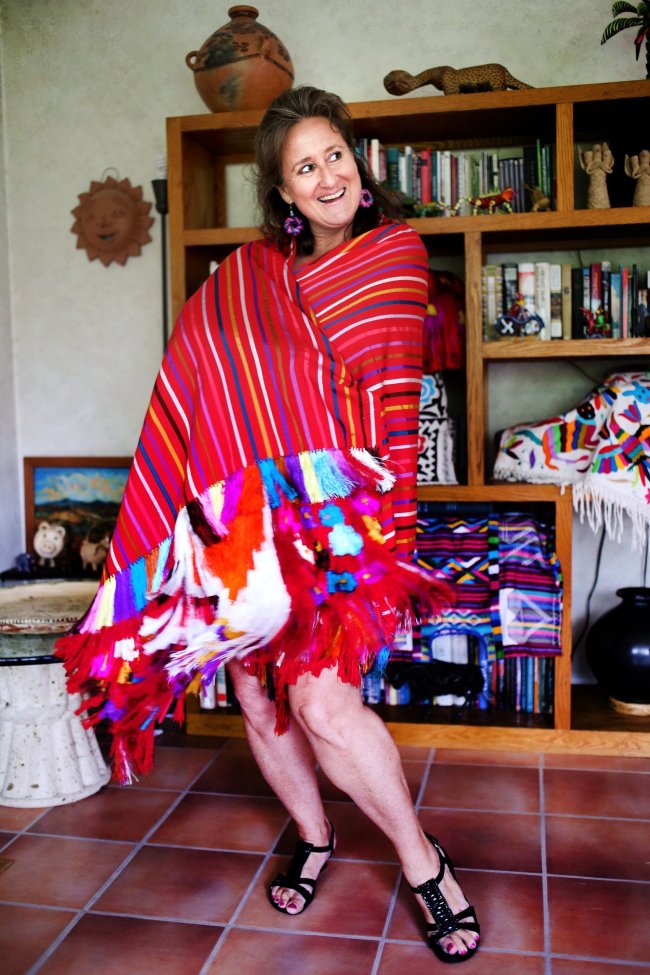ANN ARBOR, Michigan ― “A person born to be a flowerpot will not go beyond the porch.” ― Mexican proverb
Stephanie Schneiderman quit her job seven years ago and went adventuring in Mexico.
Now life is rich. Not money rich. Enjoyment rich.
Born in Havana, Cuba, and raised partly in Mexico City, Schneiderman is known as Tia (Aunt) Stephanie. And Mexico is the secret gem she loves to share with others.
 |
| Stephanie Schneidermann of Tia Stephanie Tours in Ann Arbor, Michigan, wears some of the textiles she has collected from her travels to Mexico on May 15. (Detroit Free Press/MCT) |
“When I’m in Mexico, from the minute I land, I am like a flower that gets watered,” she says. “I open up, I blossom, and I feel the energy. Then I come home, and it’s just not the same for me.”
Schneiderman, 54, wears bright clothing of beautiful Mexican textiles, even on a dreary, cold spring day in Michigan. Her Ann Arbor condo is stuffed with Mexican paintings, pots and fabrics. Her floors are wide terra-cotta tiles.
She just returned from seven months in Mexico. Her company Tia Stephanie Tours, takes small and medium-size groups on textile, art and culinary trips to a Mexico that many Americans do not know ― to remote villages in Chiapas, Oaxaca, Michoacan or the sophisticated colonial streets of Mexico City.
Here in her living room on this rainy day, she sorts through the bright pile of purple stripes and red patterns and silvery blue fringe, all textiles from her trips. These are not just pretty things, but symbols of the richness of Mexican cultural diversity and women’s weaving skill, which “exists in its true form organically for that particular group or culture,” she says. “These items you see are from very specific communities, only worn and made there.”
Planning these trips from scratch ― finding local weavers, guides, lodging, restaurants and transportation for complex itineraries ― and being an American businesswoman in traditional Mexico is something Schneiderman relishes.
“As women, our thinking is of bringing comfort to others instead of getting out of our comfort zone,” she says. “But that is where life is, where that tension and dynamic lies between safety and change.
“The unknown is a wonderful place.”
Schneiderman was a traveler from the day she was born. Her father was an international banker whose first job was in Havana. She was born there, then moved with her family to St. Thomas, Virgin Islands; to Panama City, Panama; then, when she was 5, to Mexico City in 1964.
Mexico was her whole world until age 13. Then the family moved to Coral Gables, Florida ― a major culture shock.
In Florida, she says, “the students asked me if I rode a donkey to school. They asked if we had electricity in Mexico. I went back to my mother and said I couldn’t believe how stupid these kids were.”
At the same time, she was clueless about the U.S. She pretty much knew only about her grandmother’s house in Naperville, Illinois, and about a store called Sears, and about American candy, something she had coveted back in Mexico City.
“In Mexico, we couldn’t get Tootsie Rolls, candy corn, Baby Ruth or Snickers,” she says. “Those were gold. If you went back to Mexico with a bag of those you were everybody’s best friend.”
Gradually, she grew accustomed to life in the States. She graduated from Florida International University and got a master’s degree in international business from the former American Graduate School of International Management (now Thunderbird School of Global Management) in Arizona ― the same school both her parents had attended.
Schneiderman almost married in her 20s and again in her 30s, but didn’t. Once she broke it off. Once, a boyfriend did. It was for the best, she says, “I had this voice inside of me, that said, ‘Nope. You’re going to live this life on your terms doing what you want to do.’”
At various points in her life, she has traveled alone to Italy, raced sailboats and once went down the luge track in Muskegon although she was terrified. But of all her life adventures, Mexico has the richest benefits to her well-being because of the challenge it presents and the friends she has met. She says, “There is always a cup of coffee, a fresh handmade tortilla and a bowl of beans waiting for you. Mexicans are very warm and gracious … it is my honor to be in their homes.”
By Ellen Creager
(Detroit Free Press)
(MCT Information Services)

